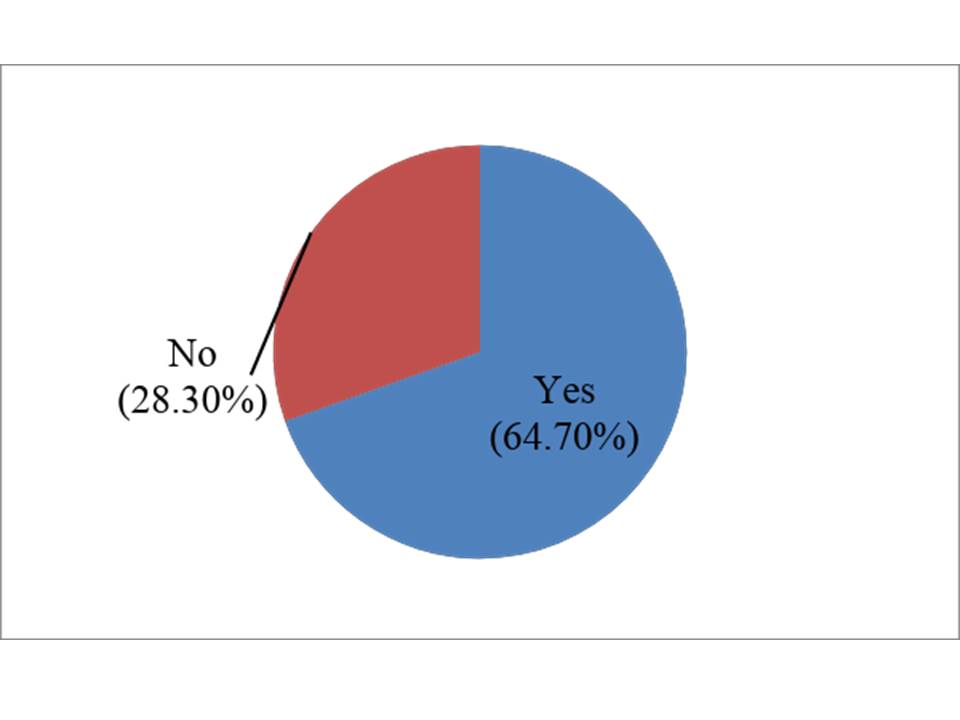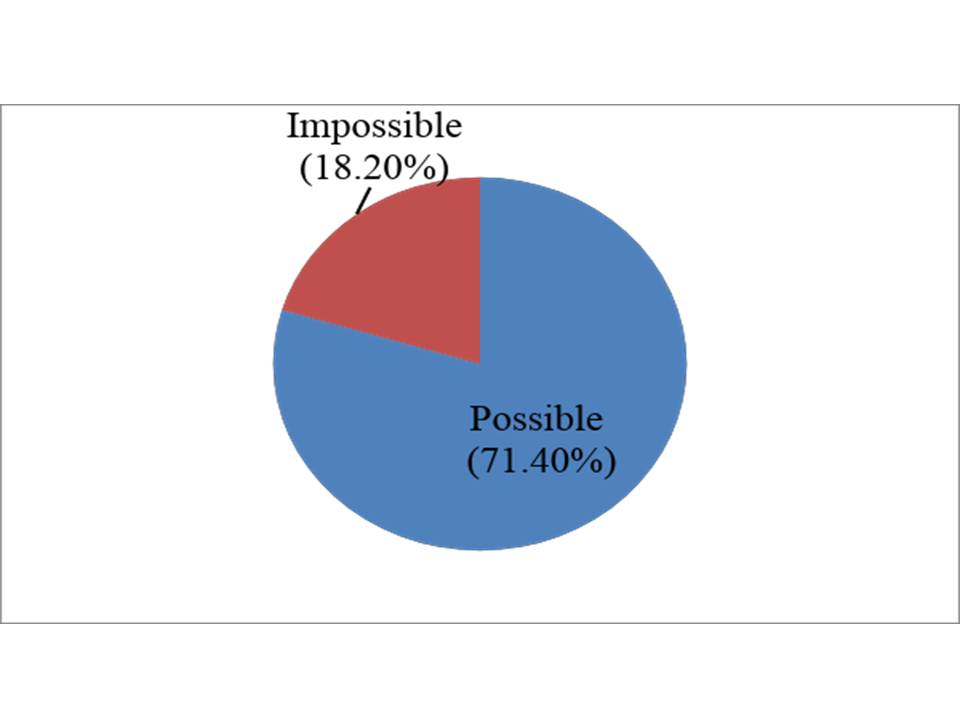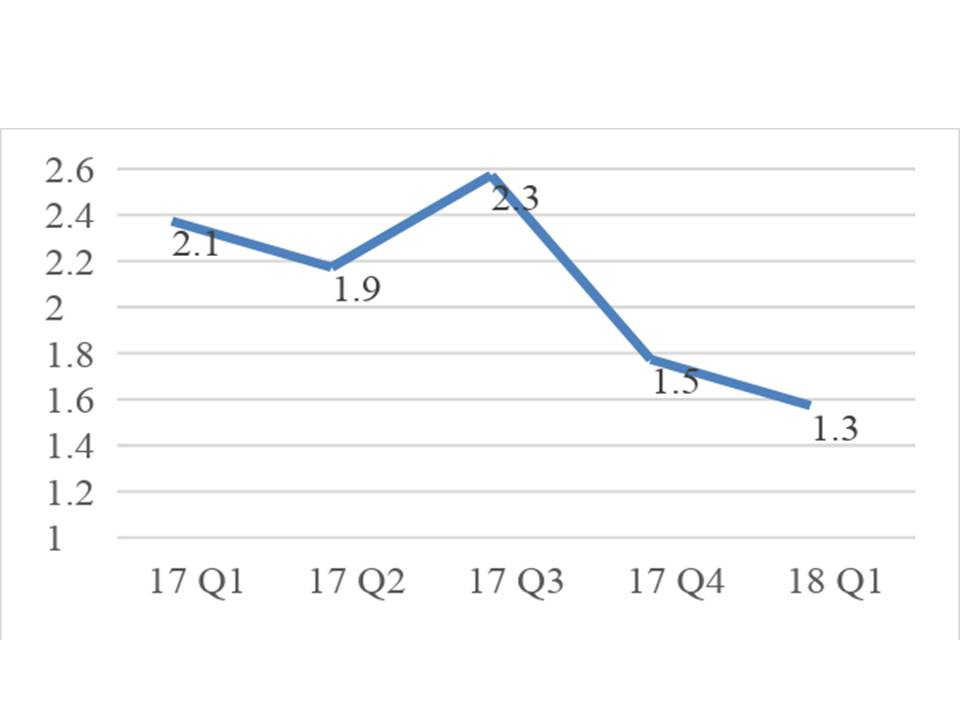The Inter-Korean Summit
South Korean President Moon Jae-in met North Korean leader Kim Jong Un at Panmunjom on April 27. It was the first meeting between the two heads of state in 11 years. The two leaders met for 12 hours and released the Panmunjom Declaration.[1]
The South Korean public reaction to the inter-Korean summit was generally favorable. According to a poll conducted by Realmeter, the support for President Moon soared to 78.3%, which is 8.3% higher than the previous week. The ruling Together Democratic Party (TDP)’s support also rose to 54.9%.[2] South Korean public’s view of North Korea’s willingness to denuclearize has undergone a significant shift as well. 64.7% of South Koreans now believe that North Korea is genuinely willing to denuclearize, while only 28.3% remain skeptical. Prior to the summit, only 14.7% believed that North Korea was willing to denuclearize and 78.3% expressed doubt.[3] 71.4% of South Koreans also believe that CVID is now possible (only 18.2% believe that it is impossible).
Do you believe in North Korea’s willingness to denuclearize?
Source: Realmeter
One interesting indicator is the sale of Pyongyang naengmyon, which was on the dinner menu at the summit. The North Korean delegation brought the venerable noodle dish from Pyongyang, which was served to both Kim and President Moon. According to a study conducted by Shinhan Credit Cards, the sale of Pyongyang naengmyon during April 27-29 (Friday~Sunday) was 80% higher than the average revenue during the previous four week period across 1500 Pyongyang naengmyon establishments in South Korea. The rise in consumption was especially pronounced among customers in their 20s, which showed a near 100% increase from the same date one year ago.[4]
Do you think CVID is possible?
Many observers viewed the summit as a success, particularly in terms of preparation, level of harmony, and sincerity among the two leaders. However, many experts stated that the summit failed to address the most important issue of denuclearization.[5] Other observers cautioned against jumping to conclusions ahead of the US-DPRK summit.
President Moon is scheduled to visit Japan on May 9 to attend the 7th trilateral summit meeting with Japan and China to discuss the recent developments in the Korean Peninsula.[6]
Constitutional Reform?
The South Korean government will not be able to hold a national referendum for constitutional reform in June.[7] President Moon tabled the reform proposal on Mar 26, but his plan fell through as the deadline for amending the National Referendum Act passed on Apr 23.
The Blue House blamed the National Assembly for failing to reach an agreement on this issue. The TDP, in turn, criticized the Liberty Korea Party (LKP) for political obstruction.[8]
The possible dates for the referendum are September 2018 and 2020. The former is being pushed by the LKP in order to have enough time to review the government’s proposed revision. The latter was proposed by the TDP because of concerns over voter turnout. The TDP claims that it would be difficult to secure a 50% voter turnout needed for the referendum to be valid in September. The next general election is scheduled for 2020.
Bank of Korea
The Bank of Korea (BOK) released its Monetary Policy Report for the 2018 Q1 on Apr 26. The report indicates that the consumer price index (CPI) fell by 1.3%.
Change in CPI
Source: BOK
This trend may be associated with a declining performance in the housing market during 2017~18. The combination of economic protectionism and North Korean risk caused fluctuations in long-term market interest rates. There is, however, continued growth in the domestic investment portfolio to buttress economic recovery. Based on these trends, the BOK decided to maintain a stable inflation outlook while accommodating for further growth by holding its base rate at 1.5%. Growth trends that the BOK hopes to continue seeing is in both domestic consumption and investment as well as exports.[9]
Supplementary Budget
Relevant ministers met on May 1 to discuss how to implement the proposed supplementary budget in light of unresolved risks, such as youth unemployment, structural adjustment, and SME revitalization.[10] The National Assembly also failed to reach a consensus on the supplementary budget. The decision regarding the budget is being delayed for two reasons. One is concern about the impact that the budget may have on the June 13 provincial elections. A second contributing factor is competing agenda – namely the legislative measures that National Assembly will need to consider following the inter-Korean summit.[11]
New Head of FSS
On May 4, the newly appointed head of the Financial Supervisory Services (FSS) Yoon Seok-hun presented his vision for South Korea’s financial regulatory reform. As an academic, Yoon is known for supporting progressive financial regulation.[12] There are three main directions in Yoon’s vision:[13]
- Preserving the independence of the FSS by disbanding the Financial Services Commission (FSC) and moving all financial and industrial policy making functions to the Ministry of Strategy and Finance (MSF). FSS will largely be responsible for regulatory enforcement. The MSF and FSS are to operate independently of one another. A new financial supervisory commission is to be established as the highest decision-making body within the FSS.
- Establishing the Financial Consumer Protection Institute (tentative name) to take over the consumer protection functions of the FSS.
- Establishing a Financial Supervisory Council (tentative name) that will act as a cooperative body for consultation on financial legislation.
A board of experts will also advise the FSS by providing policy analysis and normative recommendations.
Inter-Korean Economic Cooperation
The Ministry of Strategy and Finance (MOSF) announced that it is preparing for different types of inter-Korean economic cooperation in accordance with the Panmunjom Declaration. The MOSF has raised the issue during the Annual Meeting of the Asian Development Bank on May 3. The Korean government appears focused on getting the international community involved in promoting economic cooperation in the Korean Peninsula. The Minister of Strategy and Finance Kim Dong-yeon stated that it is important to involve relevant stakeholders as the North engages diplomatically with other countries.[14]
Legislative Bills in South Korea
| Name* | Motion | Status** | Purpose | Likelihood to Pass*** |
| Act on Punishment of Stalking Crime[15] | 2018May 3 | Department of Criminal Justice,Drafting Phase, 2018 May 3 | This Act seeks to protect victims in the early stages of stalking and to prevent it from leading to more serious crimes. A “stalking offense” refers to the act of causing anxiety or fear in a person by surveillance. Under this Act, a law enforcement officer is authorized to take actions to investigate a potential stalking offense and execute appropriate preventive measures. A court of law is permitted to take provisional measures that it deems necessary to prevent or end all stalking offense. | High |
| Special Act on the Investigation and Compensation for Damage Caused by the Shutdown of Nuclear Power Plants[16] | 2018May 2 | Referred to the Trade, Industry, Energy, SMEs, and Startups Committee, 2018 May 3 | The government has been taking steps to end the new construction and decommissioning of nuclear power plants, which includes subsidies and other support. This Act seeks to provide compensation and support for nuclear power plant employees, affiliated companies, and surrounding areas affected by the phase-out. | N/A |
| Act for the Legislation of Youth Day[17] | 2018Apr 25 | Deliberation of Resolution of National Assembly,2018 May 1 | This Act establishes the International Youth Day on August 12. The government must formulate a basic plan for youth policy and announce it on the International Youth Day. The youth shall be entitled to benefits such as the use of various cultural facilities such as parks, museums and art galleries. | High |
| Act on the Support of Parliamentary Foreign Affairs[18] | 2018Apr 23 | Referred to the House Steering Committee,2018 Apr 24 | Act seeks to establish diplomatic support offices of the National Assembly to organize and carry out its foreign policy and diplomatic efforts more systematically and transparently. | Medium to High |
*Unofficial translations **As of the date of publication
***Likelihood to pass based on news and analytical coverage by major outlets
| N/A | LOW | MEDIUM | HIGH |
| Insufficient coverage to make an assessment | Coverage generally tends to be negative | Coverage generally tends to be split between negative, affirmative, or neutral | Coverage generally tends to be in the affirmative |
[1] [Available at: http://www.koreasummit.kr/sub01/news_view.html?no=418&page=1&searchType=&searchKey= ]
[2] Realmeter, Date: April 30, May 2; sample size: 1,002; margin of error: +3.1 % at the 95% confidence level.
[3] Realmeter, Date: April 30; sample size: 500; margin of error: +4.4 % at the 95% confidence level.
[4] “평양 냉면 ‘김정은 먹방’ 특수···20대 소비 99% 치솟아”’, 중앙일보, 2018년 5월 1일.
[5] “[전문가분석] “판문점 선언, 비핵화 원론적 언급…핵심 못건드려””, 조선일보, 2018년 4월 27일.
[6] “한·일·중 정상회의 9일 도쿄서 열린다”, 중앙일보, 2018년 5월 2일.
[7] “靑, 6월개헌 무산에 “약속 지킬 수 없게 돼 안타까워”(종합)”, 연합뉴스, 2018년 5월 2일.
[8] “與 “6월 개헌, 野의 대선불복 정쟁으로 무산””, 조선일보, 2018년 4월 25일.
[9] “통화신용정책 보고서”, 한국은행, 2018년 4월 26일. Available at: [http://www.bok.or.kr/broadcast.action?menuNaviId=32].
[10] “추경예산 관련 긴급 관계장관회의…국회 처리 촉구”, 매일경제, 2018년 05월 1일.
[11] “4월 국회 ‘빈손’으로 마친 국회…5월도 난항 예상”, 한겨레, 2018년 5월 1일.
[12] “신임 금감원장에 윤석헌 서울대 교수”, 한겨레, 2018년 5월 4일.
[13] “개혁 성향 윤석헌 금감원장 내정자의 인맥은…김상조와 친분”, 중앙일보, 2018년 5월 4일.
[14] “김동연 ‘6월 말 부동산 보유세 개편안 내놓겠다’”, 중앙일보, 2018년 5월 3일.
[15] “스토킹범죄의 처벌 등에 관한 법률”, 정부이법지원센터. Available at: [http://www.lawmaking.go.kr/lmSts/govLm/2000000234567/detailRP].
[16] “원자력발전소 가동 중단 등에 따른 피해조사 및 보상에 관한 특별법안”, 정부이법지원센터. Available at: [http://www.lawmaking.go.kr/lmSts/nsmLmSts/out/2013395/detailRP].
[17] “청년의 날 제정에 관한 법률안”, 정부이법지원센터. Available at: [http://www.lawmaking.go.kr/lmSts/nsmLmSts/out/2013250/detailRP].
[18] “국회의회외교지원처법안”, 정부이법지원센터. Available at: [http://www.lawmaking.go.kr/lmSts/nsmLmSts/out/2013215/detailRP].
Contributing Staff: Kim Seonkyung, Lee Soo-hyun
Editor: J. James Kim

 Facebook
Facebook Twitter
Twitter

